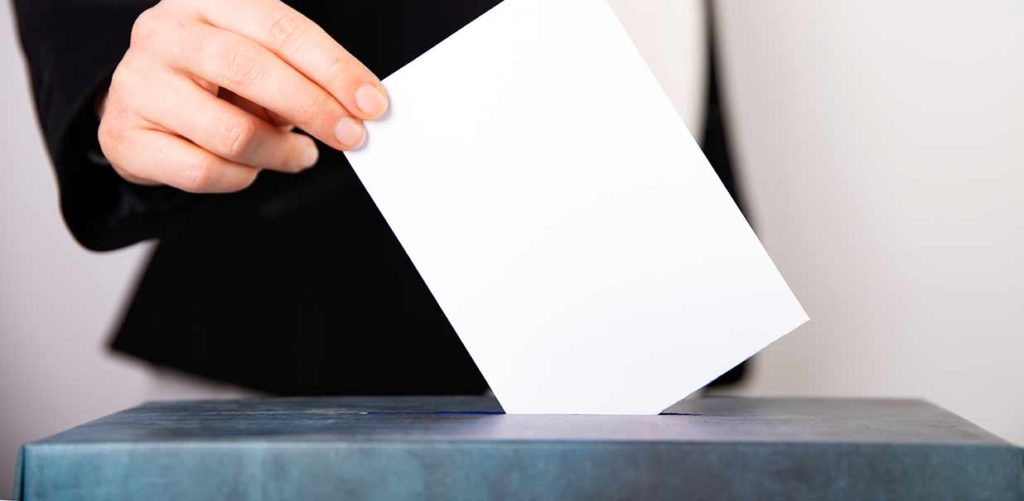Attorney for Election Crimes and Voter Fraud Offenses
Under Michigan law, many election-related activities are criminalized. It is essential to know what election law crimes are because the law takes them seriously.

If you are charged with a crime involving an election or voting, you need the help of a successful defense lawyer.
For alleged criminal activities, the county prosecutor is responsible for charging and prosecuting state election law crimes. County prosecutors rely upon local law enforcement to investigate and prepare a report. The prosecutor reviews the investigation report, evidence, and any warrant request, and if they are satisfied a crime has been committed, the prosecutor issues a warrant for prosecution.
The Michigan Attorney General also handles the prosecution of election and voting-related crimes.
Your Best Defense to Election Law Crimes
The Defense Team with LEWIS & DICKSTEIN, P.L.L.C. has decades of experience defending clients on felony and misdemeanor charges in state and federal courts throughout Michigan. We have an unparalleled track record of success and effective representation. When a client hires us to represent them regarding alleged election law crimes, we will do whatever it takes to achieve the best possible result. We will not let you down!

Statutory Authority for Police and Prosecutors
Michigan law gives police and prosecutors the authority to investigate and prosecute election law crimes.
- “It is hereby made the duty of every prosecuting attorney, whenever he shall receive credible information than any such offense has been committed, to cause the same to be prosecuted.” (MCL 168.940)
- “It is hereby made the duty of any police, sheriff or peace officer, present and having knowledge of any violation of any [election law crimes], to forthwith institute criminal proceedings for the punishment of such offender.” (MCL 168.941)
Common Election Law Criminal Violations
Election law crimes relating to voting procedures, including voter fraud, carry potential jail time and include misdemeanors and felonies. It would be too lengthy to list them all in this document, but the most commonly faced issues and important rules are as follows – people MAY NOT:
- Directly or indirectly give, lend, or promise anything of value to influence another’s vote or to have them refrain from voting. MCL 168.931(1)(a) [misdemeanor]
- Solicit votes or engage in any campaigning within 100 feet of any doorway used by voters to enter the building in which a polling place is located. Posting, displaying, or distributing within 100 feet of a polling place MCL 168.744; 931(1)(k). [misdemeanor election law crime];
- Improperly attempting to influence a person in giving their vote, deter the person from, or interrupt the person in giving their vote at any election held in this state. MCL 168.932(a) [felony]
- Breaking open or violating the seals or locks of any ballot box or voting machine or causing willful damage to such a machine. A person shall not obtain illegal possession of that ballot box or voting machine. A person shall not conceal, withhold, or destroy a ballot box or voting machine or fraudulently or forcibly add to or diminish the number of ballots legally deposited in the box or the totals on the voting machine. MCL 168.932(b) [felony]
- If a clerk or other officer willfully damages or falsifies any record, election list of voters, affidavit, return, statement of votes, certificates, poll book, or of any paper, document, or vote, or fraudulently makes any entry, erasure, or alteration on any or all of those items, is guilty of a felony election law crime. MCL 168.932(c) [felony]
- Misrepresent by word or act in a polling place on election day that they are an election official if that person is not an election official. MCL 168.932e(1), (2) [felony]
- Names of elected or appointed public officials “shall not appear on any material that is temporarily posted, displayed, or distributed in a polling place or polling room on election day.” MCL 168.744(1) [misdemeanor]
- While an absentee voter is voting, attempt to influence the absentee voter on how they should vote. MCL 168.932(g), (h) [misdemeanor]
- Being in possession of another person’s absent voter ballot is an election law crime unless the person 1) is a member of the voter’s immediate family and has been asked by the voter to return the ballot, 2) resides in the voter’s household, and has been asked by the voter to return the ballot, 3) is responsible for handling mail (but only during the course of their employment), or 4) is an authorized election official. (MCL 168.932(f)) [felony]
- Swear a false oath to register to vote or to vote. MCL 168.933 [felony]
- Intimidating an election official with intent to interfere with their election-related duties. First and second offenses are treated as misdemeanors, but a third or subsequent offense carries a felony charge. Intimidation, under Michigan law, is an unconstitutional, unprotected action intended to cause injury or someone to fear injury.
Defenses to Felony and Misdemeanor Allegations
As can be seen, the election laws are incredibly complicated, and people engaging in the system may easily and inadvertently find themselves on the wrong side of the law. The above rules are only a sample of the total laws on the books. Sometimes, innocent people are arrested and charged for election law crimes they honestly did not know were illegal.
Top criminal defense lawyers, such as those with LEWIS & DICKSTEIN, P.L.L.C., employ tailored strategies when defending clients accused of specific election law crimes, such as interference with an election worker, tampering with a ballot box, or falsifying election records. First, they meticulously review the evidence related to the alleged interference or tampering, seeking procedural flaws or inconsistencies. This scrutiny can involve examining surveillance footage, scrutinizing the chain of custody for ballots, and evaluating the testimony of election officials and witnesses.
In cases of alleged falsification of records, defense lawyers may focus on the intent element of the crime. They could argue that any record inaccuracies were due to error or misinterpretation rather than deliberate falsification. Challenging the technical aspects of how records were handled and maintained can also be crucial.
Furthermore, the defense might argue constitutional violations, such as asserting that the client’s rights were infringed during the investigation. This could include challenging the legality of searches and seizures related to evidence collection or contesting the methods used to obtain statements or admissions from the accused.
In all these scenarios, discrediting the reliability of key witnesses is a common tactic. The defense might highlight potential biases or inconsistencies in the testimonies of election workers or other witnesses. Finally, if the evidence against the client is strong, negotiating a plea deal might be the most pragmatic approach, aiming to reduce potential penalties or charges in exchange for a guilty plea. This is especially relevant in complex election law cases where the full context and intent behind actions can be pivotal.

Election Law Defense Attorneys in Michigan
Having decades of experience in criminal defense, the expert Defense Team at LEWIS & DICKSTEIN, P.L.L.C. knows that innocent people frequently face allegations of election law crimes. And we know that even if a crime was committed, there is often a reasonable explanation that we can explain to a judge or prosecutor. Our passion is to help everyone charged with a crime, even if the situation seems hopeless. We strive daily to fight the good fight for our clients, have charges dismissed, have cases thrown out of court, and put clients back on their path before being charged with a crime.
The highly experienced and zealous defense attorneys at LEWIS & DICKSTEIN, P.L.L.C. have successfully represented thousands of clients on felony and misdemeanor charges in Michigan and federal courts, including election law crimes. We have an unparalleled track record for providing the highest quality defense for election law offenses while showing compassion and close attention to each client.
Call us today at (248) 263-6800 for a free consultation or complete an online Request for Assistance Form. We will contact you promptly and find a way to help you.







